|
|
|
Sort Order |
|
|
|
Items / Page
|
|
|
|
|
|
|
| Srl | Item |
| 1 |
ID:
132326
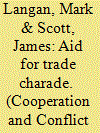

|
|
|
|
|
| Publication |
2014.
|
| Summary/Abstract |
Aid for Trade (AfT) has gained prominence as an innovative form of donor support in the 'post'-Washington Consensus. AfT mechanisms have been praised as a means of aligning trade liberalisation deals (whether in the Doha Round or within bilaterals) to poverty reduction objectives. This article, through critical analysis of AfT discourse within the 'moral economies' of multilateral World Trade Organization and bilateral European Union-African, Caribbean and Pacific negotiations, points to the strategic purposes of donor language in rationalising asymmetric North-South trade systems. Moreover, it questions the 'development' credentials of AfT assistance by examining some of the ensuing private sector activities and the impact on the supposed beneficiaries, and the tying of AfT disbursements to the implementation of inappropriate policies.
|
|
|
|
|
|
|
|
|
|
|
|
|
|
|
|
| 2 |
ID:
124204
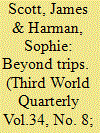

|
|
|
|
|
| Publication |
2013.
|
| Summary/Abstract |
The current round of World Trade Organization (WTO) negotiations-the Doha Round-has significant implications for global health which have received insufficient attention from the global health community. All too often the health implications of global trade agreements are examined only after their conclusion, and are concerned only with intellectual property rights. This paper seeks to move beyond this narrow focus and elucidate the wider health implications of the Doha Round. It explores the negative effect of the Round on state capacity to provide and regulate health services in low-income countries, and the impact it will have on livelihoods among the poor and their ability to access health services. Overall the paper makes the case for greater engagement from the health community with the wto and the Doha Round negotiations beyond the customary focus on intellectual property rights.
|
|
|
|
|
|
|
|
|
|
|
|
|
|
|
|
| 3 |
ID:
132959
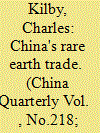

|
|
|
|
|
| Publication |
2014.
|
| Summary/Abstract |
Rare earth elements (REE) captured a startled world's attention during the 2010 Diaoyu/Senkaku Islands crisis, when it appeared that China withheld access to them during its border dispute with Japan. China asserts that its sovereign right to environmental regulation and national production quotas is unassailable. However, China's trade measures appear to be inconsistent with WTO rules, as well as with environmental protection and conservation, since they incentivize illegal mining and smuggling practices. In an upcoming case (DS431), the United States, the European Union, Japan and 16 third parties will argue before the WTO that China's trade measures on rare earths, tungsten and molybdenum constitute discriminatory behaviour and are illegal. This raises the question of whether China is inappropriately using the environment as a defence against allegations that its rare earth trade policies are in violation of its WTO obligations.
|
|
|
|
|
|
|
|
|
|
|
|
|
|
|
|
| 4 |
ID:
132536
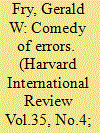

|
|
|
|
|
| Publication |
2014.
|
| Summary/Abstract |
Political crises are nothing new for Thailand. Since becoming a constitutional monarchy in 1932, the country has faced numerous political crises, including a 1973 student revolution to overthrow a military dictatorship, the storming of Thammasat University and the installation of an extremely right-wing government in 1976, and the people power victory over General Suchinda in 1992. In September 2006, a military coup deposed the former prime minister, Dr. Thaksin Shinawatra. In retaliation against the coup, Thaksin supporters in 2006 formed the United Front for Democracy against Dictatorship (UDD), a political pressure group whose supporters are commonly called Red Shirts.
|
|
|
|
|
|
|
|
|
|
|
|
|
|
|
|
| 5 |
ID:
067956
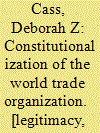

|
|
|
|
|
| Publication |
Oxford, Oxford University Press, 2005.
|
| Description |
xxvii, 266p.
|
| Standard Number |
0199285845
|
|
|
|
|
|
|
|
|
|
|
|
Copies: C:1/I:0,R:0,Q:0
Circulation
| Accession# | Call# | Current Location | Status | Policy | Location |
| 050826 | 382.92/CAS 050826 | Main | On Shelf | General | |
|
|
|
|
| 6 |
ID:
133275
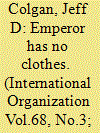

|
|
|
|
|
| Publication |
2014.
|
| Summary/Abstract |
Scholars have long debated the causal impact of international institutions such as the World Trade Organization or the International Monetary Fund. This study investigates Organization of Petroleum Exporting Countries (OPEC), an organization that purports to have significant influence over the market for the world's most important commodity-petroleum. Using four empirical tests, I find that OPEC has little or no impact on its members' production levels. These findings prompt the question of why so many people, including scholars, believe in OPEC's influence over the world's oil supply. The idea of OPEC as a cartel is a "rational myth" that supports the organization's true principal function, which is to generate political benefits for its members. One benefit it generates is international prestige. I test this idea using data on diplomatic representation and find that OPEC membership is associated with increased international recognition by other states. Overall, these findings help one to better understand international regimes and the process of ideational change in world politics.
|
|
|
|
|
|
|
|
|
|
|
|
|
|
|
|
| 7 |
ID:
123713
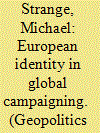

|
|
|
|
|
| Publication |
2013.
|
| Summary/Abstract |
What does it mean when activist networks describe themselves as 'European' or 'Global'? Existing studies into the geographic character of such networks have focused on the interplay between multiple 'levels'. However, there is a need for greater research on the discursive function played by geographic descriptors within the formation of activist networks. This article examines the use of multiple geographic descriptors to articulate a particular activist network - the 'Seattle to Brussels' (S2B) network - consisting of European-based groups contesting the form of multilateral trade governance embodied in the WTO. To map out how groups forged relations with one another under a 'European' identity, the article applies a discourse theoretical analysis to extensive empirical data including interviews with activists and participant observation at key events. The article has relevance to understanding both how transnational protest networks are formed and the role of multiple geographic signifiers in global politics.
|
|
|
|
|
|
|
|
|
|
|
|
|
|
|
|
| 8 |
ID:
132695
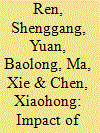

|
|
|
|
|
| Publication |
2014.
|
| Summary/Abstract |
This paper employs the input-output (IO) approach to analyze the scale and structure of embodied carbon emissions of China×s 19 industry sectors during 2001-2011 and constructs a regression model to establish the relationship between energy intensity, per capita output, trade openness, foreign direct investment (FDI), trade comparative advantage, environmental regulation, technology, and CO2 emission intensity. Our results suggest that: China×s international embodied carbon emission balance has been in a state of continuous growth for the period 2001-2011, and China has become a pollution haven; the relationship between per capita output and CO2 emission is inverse N-typed and China×s industries are in the rising stage of the curve; FDI and trade comparative advantage are two main elements boosting China×s carbon emissions; trade openness, environmental regulation, and technology will lower the growth rate of China×s industrial carbon emissions (ICEs). Consequently, China×s policies should center on adjusting the industry structure and scale of FDI inflows, transforming industries with trade comparative advantages into a clean type, facilitating environmental regulation level, and bringing in and developing low-carbon technology to avert China from being a pollution haven.
|
|
|
|
|
|
|
|
|
|
|
|
|
|
|
|
| 9 |
ID:
130189
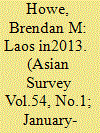

|
|
|
|
|
| Publication |
2014.
|
| Summary/Abstract |
In 2013 Laos joined the World Trade Organization, economic growth was over 8%, and graduation from least-developed country status by 2020 remains achievable. But its human development index of 0.543 remained below the regional average. Macro development projects still threaten the vulnerable. The abduction of a prominent campaigner and repatriation of North Korean refugees highlighted human rights challenges.
|
|
|
|
|
|
|
|
|
|
|
|
|
|
|
|
| 10 |
ID:
127777
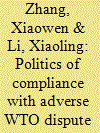

|
|
|
|
|
| Publication |
2014.
|
| Summary/Abstract |
Starting from 2004, China's trading partners, in particular the United States, have increasingly utilized the World Trade Organization (WTO) dispute settlement system (DSS) to challenge China's trade-related measures. As a major player in world trade, how China responds to adverse rulings is not only important to its trading partners, but also for the future of the international trade regime. China has thus far held a relatively good compliance record when facing adverse panel and/or Appellate Body rulings, except for the recent delay in full compliance in China-Publications and Audiovisual Products. Through examining the factors affecting China's decision making when targeted in a WTO dispute, this article finds that, in general, China is highly motivated to comply with the WTO DSS due to the reputational costs of noncompliance. Nevertheless, the recent delay in compliance in China-Publications and Audiovisual Products also demonstrates that successful implementation could be impeded by certain politically influential interest groups, especially when the measure at dispute is politically sensitive.
|
|
|
|
|
|
|
|
|
|
|
|
|
|
|
|
| 11 |
ID:
133976
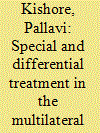

|
|
|
|
|
| Publication |
2014.
|
| Summary/Abstract |
Special and differential treatment (S&DT) provisions relate to developing and least developed members of the World Trade Organization (WTO). The effectiveness of S&DT provisions is important because they (1) address asymmetries between members and (2) give the WTO a global character, i.e. it is perceived as catering to the interests of all its members. Have these provisions been effective? Not really. This is mainly because these provisions are non-binding, ambiguous, unstructured and lack connectivity with each other. Developing countries claim they are best endeavour clauses and unrealistic. So how can these provisions be made effective? This article examines the concept of S&DT including its history, reasons behind its introduction and continuation, its merits and demerits, reasons for its success and failure, its jurisprudence, and provides suggestions for improvement.
|
|
|
|
|
|
|
|
|
|
|
|
|
|
|
|
| 12 |
ID:
127355
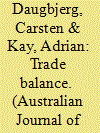

|
|
|
|
|
| Publication |
2014.
|
| Summary/Abstract |
The establishment of the World Trade Organization (WTO) has been widely accepted as representing the legalisation of world trading rules. However, it is important to reflect on the limits of this legalisation thesis in terms of the interface between international and domestic policy processes. By locating trading disputes in a political analysis of policy implementation, it is argued that it is difficult to establish conceptually how the WTO dispute settlement system could have authority separate from and above the conventional international politics of trade policy relations. Instead, the article argues that case outcomes should be expected to be largely the product of domestic political institutions and policy processes, and how these intersect with developments in the WTO dispute settlement system. Brief studies of the Australian government's dispute settlement strategy and two high-profile WTO disputes-the US upland cotton and European Union sugar cases-serve to suggest that the authority of international trade law is not as significant as assumed by the legalisation thesis. Rather, domestic politics and institutions have an important impact on the outcome of trade disputes.
|
|
|
|
|
|
|
|
|
|
|
|
|
|
|
|
| 13 |
ID:
133112
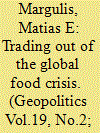

|
|
|
|
|
| Publication |
2014.
|
| Summary/Abstract |
The geopolitics of the Global Food Crisis and international trade has received limited scholarly attention, a significant omission given the major roles of the World Trade Organization (WTO) in structuring world food production and trade flows and as a principal inter-state governing mechanism of the global agro-food system. Analysing recent international policy actions framing the WTO as a 'fix' to the Global Food Crisis, this article points to the value of a critical geopolitics of agro-power sensitive to the spatial reconfiguration of production and power in the global agro-food system, problematising geospatial categories such as 'North' and 'South', and that takes seriously contests for control of geopolitical agents such as the WTO.
|
|
|
|
|
|
|
|
|
|
|
|
|
|
|
|
| 14 |
ID:
133742
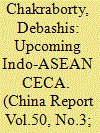

|
|
|
|
|
| Publication |
2014.
|
| Summary/Abstract |
Since the initiation of economic reforms in 1991, 'Look East Policy' has been a major component of India's trade diplomacy. During the first decade after inception of WTO, India relied heavily on the multilateral trade reforms for securing export growth, but slow progress of the Doha Round negotiations caused it to shift focus on the regional trade agreements (RTAs) instead from 2004 onwards. The Association of Southeast Asian Nations (ASEAN) in Southeast Asia emerged as India's natural trade partner with its lucrative market but the negotiations proved to be a complex exercise. The Indo-ASEAN Free Trade Agreement (FTA) covering merchandise products has boosted bilateral trade flows, but the balance of trade has improved in ASEAN's favour. The current article attempts to analyse the potential trade effects for India from its deepened trade relationship with ASEAN through the proposed Indo-ASEAN comprehensive economic cooperation agreement (CECA) covering trade in services and investment provisions.
|
|
|
|
|
|
|
|
|
|
|
|
|
|
|
|
| 15 |
ID:
133741
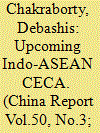

|
|
|
|
|
| Summary/Abstract |
Since the initiation of economic reforms in 1991, 'Look East Policy' has been a major component of India's trade diplomacy. During the first decade after inception of WTO, India relied heavily on the multilateral trade reforms for securing export growth, but slow progress of the Doha Round negotiations caused it to shift focus on the regional trade agreements (RTAs) instead from 2004 onwards. The Association of Southeast Asian Nations (ASEAN) in Southeast Asia emerged as India's natural trade partner with its lucrative market but the negotiations proved to be a complex exercise. The Indo-ASEAN Free Trade Agreement (FTA) covering merchandise products has boosted bilateral trade flows, but the balance of trade has improved in ASEAN's favour. The current article attempts to analyse the potential trade effects for India from its deepened trade relationship with ASEAN through the proposed Indo-ASEAN comprehensive economic cooperation agreement (CECA) covering trade in services and investment provisions.
|
|
|
|
|
|
|
|
|
|
|
|
|
|
|
|
| 16 |
ID:
133277
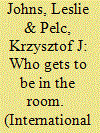

|
|
|
|
|
| Publication |
2014.
|
| Summary/Abstract |
Third parties complicate World Trade Organization (WTO) dispute settlement by adding voices and issues to a dispute. However, complainants can limit third parties by filing cases under Article XXIII of the General Agreement on Tariffs and Trade (GATT), rather than Article XXII. We argue that third parties create "insurance" by lowering the benefit of winning and the cost of losing a dispute. We construct a formal model in which third parties make settlement less likely. The weaker the complainant's case, the more likely the complainant is to promote third party participation and to settle. Article XXII cases are therefore more likely to settle, controlling for the realized number of third parties, and a complainant who files under Article XXIII is more likely to win a ruling and less likely to see that ruling appealed by the defendant. We provide empirical support using WTO disputes from 1995 to 2011.
|
|
|
|
|
|
|
|
|
|
|
|
|
|
|
|
|
|
|
|
|